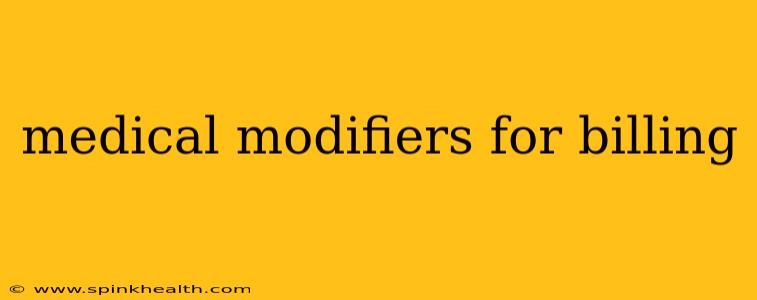Decoding the Mystery: Medical Modifiers for Billing
The world of medical billing can feel like navigating a dense jungle, filled with codes, terms, and… modifiers! These seemingly small additions to billing codes can drastically change the reimbursement you receive. Understanding them is crucial for both providers and payers to ensure accurate and timely payments. Let's shed some light on this often-overlooked aspect of healthcare finance.
Imagine this: You're a hardworking physician, meticulously documenting patient visits and procedures. You diligently code each service, confident in your accuracy. But then, the payment comes back lower than expected. What went wrong? Often, the missing piece is the appropriate medical modifier.
Medical modifiers are alphanumeric codes appended to a procedural or diagnostic code to provide additional information about the service performed. They clarify circumstances that might otherwise be ambiguous, ensuring the payer understands the exact nature of the service and can process the claim correctly. Think of them as tiny, but powerful, clarifiers.
What are the different types of medical modifiers?
There's a whole alphabet soup of modifiers, each with a specific meaning. While the complete list is extensive, some frequently used modifiers include:
-
Modifier -25: This indicates that a significant, separately identifiable evaluation and management (E&M) service was performed on the same day as another procedure or service. This is crucial because without it, the payer might bundle the E&M service with the procedure, reducing your reimbursement.
-
Modifier -59: This modifier indicates that a procedure or service is distinct from other procedures or services performed on the same day. It helps to prevent bundling when multiple procedures are done that might otherwise be grouped together. It’s important to note that the use of -59 has been discouraged in recent years, and other more specific modifiers should be used where possible.
-
Modifier -63: This modifier is used to indicate a procedure performed during an emergency. It clarifies the urgency of the situation and might influence reimbursement depending on the payer’s policies.
-
Modifier -76: This signifies that a repeat procedure was performed by the same physician, but is considered distinct from the initial procedure. This clarifies that it is not a repeat of the same procedure due to a complication.
-
Modifier -90: This modifier signals a bilateral procedure –meaning a procedure was performed on both sides of the body (e.g., bilateral knee replacements).
-
Modifier -91: This indicates that a repeat procedure was performed by a different physician.
-
Modifier -GA: This modifier indicates that the physician performed anesthesia for a procedure which may have already been billed by another provider. This modifier is used to prevent the double billing of the anesthesia service.
How do medical modifiers impact reimbursement?
The impact of modifiers on reimbursement can be significant. Using the incorrect modifier, or failing to use a necessary modifier, can lead to:
-
Underpayment: The payer might bundle services or fail to recognize the complexity of the procedures performed.
-
Claim denial: In some cases, the absence of a necessary modifier can lead to the entire claim being denied.
-
Audits and penalties: Incorrect modifier use can draw the attention of auditors, potentially resulting in penalties and recoupment of payments.
How do I choose the right modifier?
Choosing the correct modifier requires a careful review of the circumstances surrounding the service performed. This involves:
-
Accurate documentation: Meticulous medical record keeping is paramount. The documentation must clearly support the use of any modifier appended to a claim.
-
Understanding payer guidelines: Each payer might have specific rules and guidelines regarding the use of modifiers. It's crucial to stay updated on these guidelines.
-
Consulting resources: Many resources are available to help healthcare providers understand and apply modifiers correctly, including online coding manuals, professional coding organizations and billing specialists.
What are some common mistakes in using medical modifiers?
-
Overusing Modifier -59: As mentioned earlier, -59 is often used inappropriately to prevent bundling, when more specific modifiers would be more accurate.
-
Using the wrong modifier: Selecting a modifier without understanding its specific meaning can lead to incorrect billing.
-
Failing to use a necessary modifier: Omitting a crucial modifier can result in underpayment or denial.
Navigating the world of medical modifiers can be challenging, but it’s a critical aspect of accurate and successful medical billing. By understanding their purpose, selecting the appropriate modifiers, and staying informed about payer guidelines, you can ensure that you are properly reimbursed for the services you provide. Remember, precision is key in this arena – and every little detail counts!

